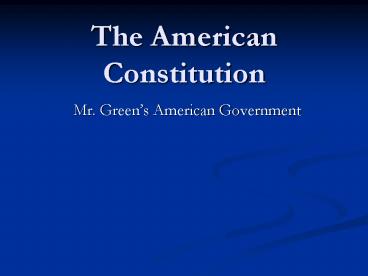The American Constitution - PowerPoint PPT Presentation
1 / 46
Title:
The American Constitution
Description:
The First 10 Amendments. Amendments 11 through 27. Constitutional Convention. The Constitution ... Section 3.6 Senate Has Sole Power To Try All Impeachments ... – PowerPoint PPT presentation
Number of Views:218
Avg rating:3.0/5.0
Title: The American Constitution
1
The American Constitution
- Mr. Greens American Government
2
Outline of the Lecture
- Republic or Democracy?
- Classical Liberalism
- John Locke and The Second Treatise on Government
- Thomas Jefferson and The Declaration of
Independence - James Madison (and others) and The Constitutional
Convention - James Madison) and The Federalist Papers
- The Constitution of the United States
- The Bill of Rights
- The First 10 Amendments
- Amendments 11 through 27
3
Constitutional Convention
4
The Constitution
5
The Federalist Papers
- The Anti-Federalists Opposed Ratification
- Sam Adams in Massachusetts , Patrick Henry in
Virginia, Brutus(Robert Yates?) In New York - The Federalists Supported Ratification
- Publius
6
The Authors of The Federalist Papers
John Jay
Alexander Hamilton
James Madison
7
Federalist 51
8
The Constitution
9
Preamble
10
Article One The Legislative
- Section. 1 The Legislative Powers Rests With
Congress Composed Of Senate and House of
Representatives. - Section 2. The House Members Qualifications
- 25 Years of Age
- 7 Years A Citizen
- Resident of Their District
- Serve Two Years
- Elected by the People
- Apportioned by Population
11
Article One The Legislative
- Section 2.5
- Choose Speaker and Other Offices
- Sole Power of Impeachment
- Section 3 Senate Members Qualifications
- 30 Years of Age
- 9 Years A Citizen
- Resident of Their District
- Serve Six Years
- Elected by the State Legislatures
- Two Senators from Each State
12
Article One The Legislative
- Section 3.4
- Vice President Presides
- No Vote Except For Ties
- Section 3.5 Senate To Choose Their Leaders
- Section 3.6 Senate Has Sole Power To Try All
Impeachments - Section 3.7 Judgment in Impeachment Is Removal
from Office
13
Article One The Legislative
- Section 6.1 Senators and Congressmen Compensated
From the Treasury - Section 6.2 Senators and Congressmen Cannot Be
Members of the Executive Branch While in Office - Section 7.1 Bill For Raising Revenue Begin In
the House - Section 7.2 The Veto
14
Veto
15
Article 1
16
Article 1
17
Article 1
18
Article 1
19
Article One The Legislative
- Review of Section 8
- 81 and 8.2 The general welfare clauses
- 8.3 The commerce clause
- 8.18 The elastic clause
- Section 9.7 Government Cannot Spend Money From
the Treasury Except By Appropriation - Section 10.1 State Cannot Make Treaties or
Alliances, Pass Bills Of Attainder, Ex Post Facto
Laws, or Laws Impairing the obligation of
contracts
20
Article Two The Executive
- Section. 1.1 The Executive Power Is Vested in
The President of the United States . . . - Section. 1.2 Electoral College
21
Electoral College tiff
22
Electoral College tiff
23
Electoral College tiff
24
Article Two The Executive
- Section 1.4 Qualifications
- Natural Born Citizen
- 35 Years of Age
- 14 Years a Citizen
- Section 2.1 Power of Commander in Chief
- Section 2.2 Power to Make Treaties, Appoint
Ambassadors, and Supreme Court Justices With the
Advise and Consent of Two-thirds of the Senate
25
Article Two The Executive
- Section 3.1 The State of the Union
26
Article Three The Judiciary
- Section 1 Judicial Power Vested in The supreme
court, and Other Inferior Courts as Established
by Congress - Section 2 Judicial Power Limited To cases and
controversies
27
Article Four
- Section 1 full faith and credit By Each State to
Other States - Section 2 Citizens Of One State Are Entitled to
the Same privileges and immunities of the
Citizens of Another State - Section 4 Congress Guarantees Each State A
republican government
28
Article Five Amendment Process
29
Article Six
- Supremacy Clause
- Laws and Treaties Passed by Congress shall be
the supreme law of the land
30
Ratification
31
The Bill of Rights
32
James Madison The First Speaker
33
Amendment 1
34
Amendment 2
35
Bill of Rights
- Amendment Two
- Collective Right?
- Individual Right?
- Amendment 3 Quartering Troops
- Due Process of Law
- Amendments 4, 5, and 6
- Habeas Corpus
- Contained in Amendment 5 and 6
36
Amendment 4
37
Amendment 5
38
Amendment 6
39
Bill of Rights
- Amendment 7 Guarantee of Jury Trial
- Amendment 8 No Excessive Bail nor cruel and
unusual punishments - Amendment 9 Rights Not Listed Are Protected
- Amendment 10 Powers Not Delegated To the Federal
Government Are Retained by the States
40
The Other Amendments
41
Amendments
- Amendment 11 Suing a State (1795)
- Amendment 12 Presidential Candidates Run as a
Ticket (1804) - The Civil War Amendments
- Amendment 13 Prohibition of Slavery (1865)
42
Amendment 14
43
Amendments
- Amendment 11 Suing a State (1795)
- Amendment 12 Presidential Candidates Run as a
Ticket (1804) - The Civil War Amendments
- Amendment 13 Prohibition of Slavery (1865)
- Amendment 14 Rights of Citizenship (1868)
- Amendment 15 Right to Vote Cannot Be Denied
Because of Race (1870)
44
Amendments
- The Progressive Amendments
- Amendment 16 Income Tax (1193)
- Amendment 17 Direct Election of Senators (1913)
- Amendment 18 Prohibition (1919)
- Amendment 19 Womens Suffrage (1920)
- Amendment 20 Lame Duck Amendment (1933)
- Amendment 21 Repeal of Prohibition (1933)
45
Amendments
- Amendment 22 Presidential Term Limits (1951)
- Amendment 23 Electors for DC (1961)
- Amendment 24 Poll Tax (1964)
- Amendment 25 Presidential Succession (1967)
- Amendment 26 Suffrage for Persons Eighteen Years
Old (1971) - Amendment 27 Congressional Pay Raises (Proposed
1789, Ratified 1992)
46
The End































